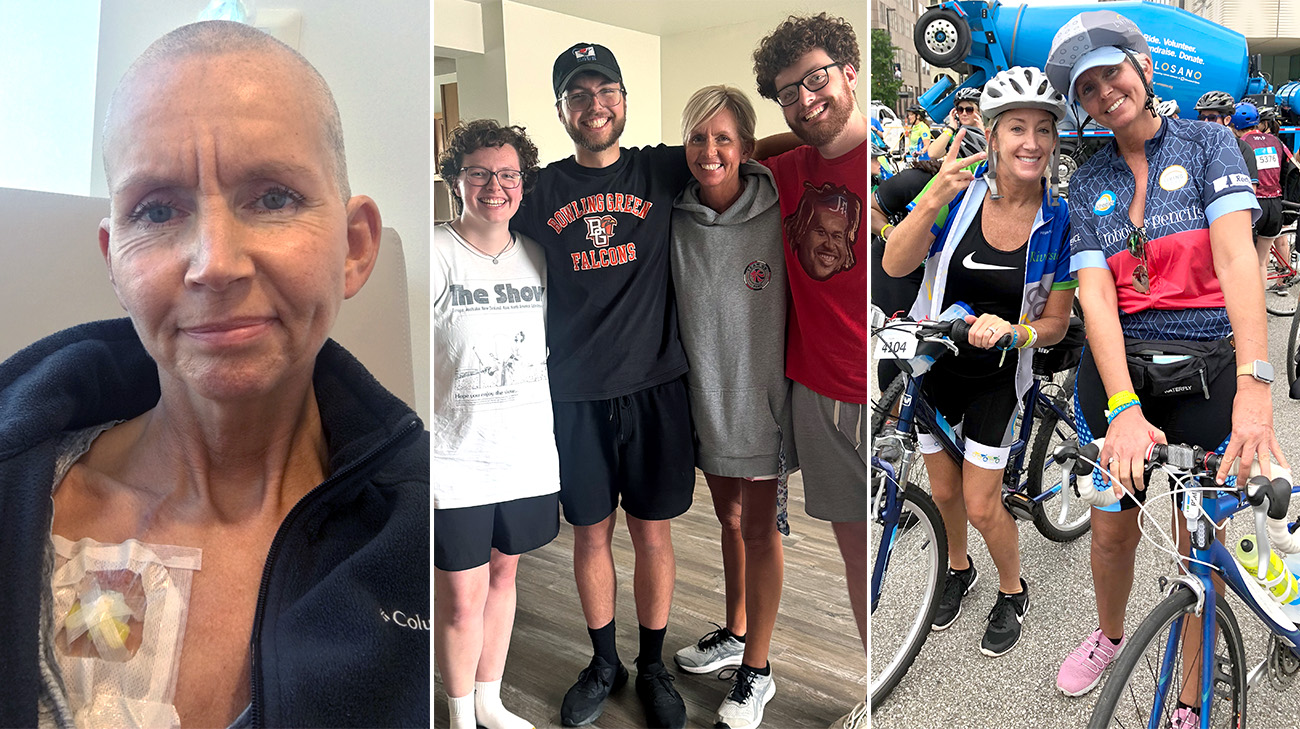
Being on chemotherapy since April 2018, Claire Firrell views her cancer as a chronic illness she works with her doctors to manage. The devoted mother of three has continued living life to the fullest even after finding out her colorectal cancer had spread.
“When the doctor told me it moved to my lungs, I thought I can’t not be here for my kids. I wanted to see my youngest graduate high school. Well, I did that – and now she’s halfway through her college career,” says Claire, 55, of Seven Hills, Ohio.
Claire’s health journey began in 2015, when she started experiencing abdominal pain. Busy with work and raising her kids, she didn’t give it much thought at first.
“I started noticing I was stopping my conversations, almost like a contraction, while this wave of pain would come through. I knew there was something not right, so I left work that day to go to the emergency department,” says Claire.
Claire underwent testing, and the next day had a colonoscopy. Results showed a tumor. In November 2015, doctors ultimately diagnosed her with stage 3 colorectal cancer. It had spread to her lymph nodes. She then began her treatment at Cleveland Clinic.
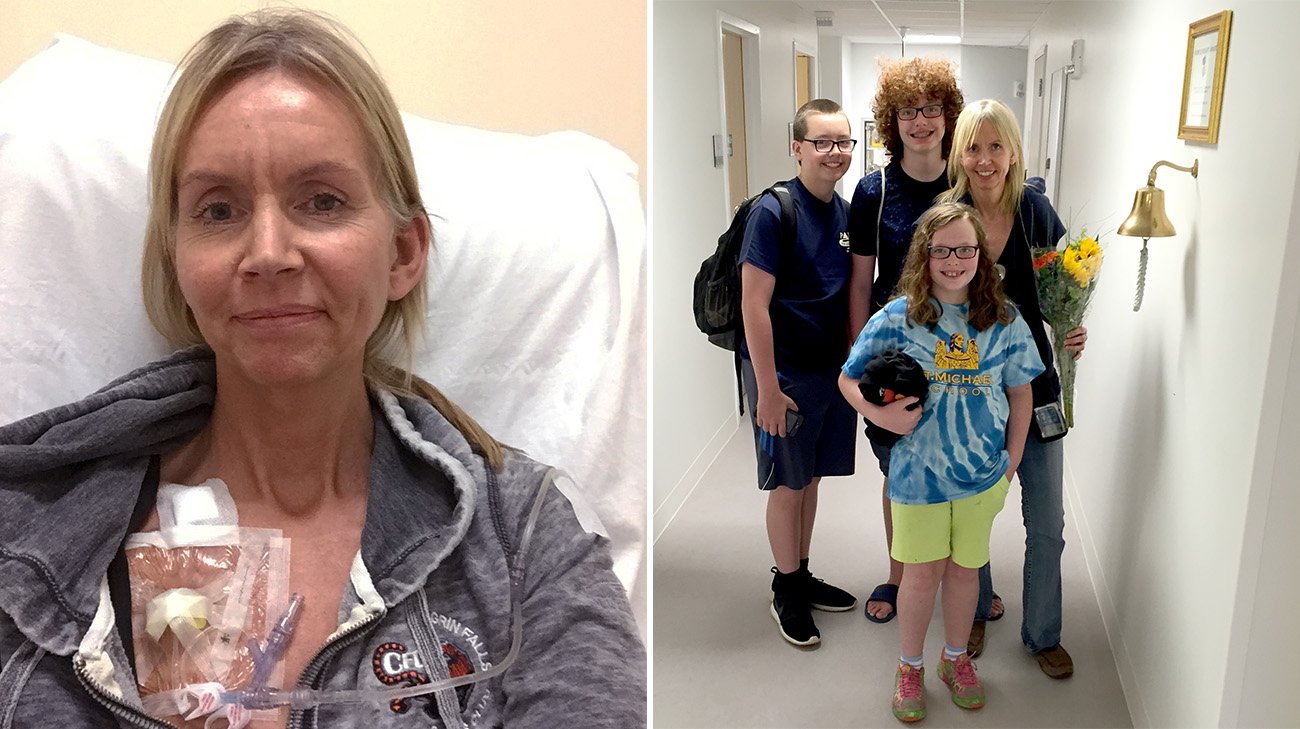
After Claire’s colorectal cancer diagnosis in 2015, she underwent surgery and chemotherapy. (Courtesy: Claire Firrell)
“I knew I couldn't keep up with the pace I was going and clearly my body was telling me that was the case,” says Claire, who was 46 years old at the time of her diagnosis. While colorectal cancer is more common after age 50, cases continue rising among younger adults.
Her initial treatment included surgically removing the tumor, a section of her colon and some lymph nodes. She also had 12 rounds of chemotherapy. Claire received clear scans following the treatment, but over a year later, she felt a lump. Further testing showed the cancer had returned.
“The cancer spread to the abdominal wall, so she had a second surgery and radiation at that point,” says Claire’s medical oncologist Alok Khorana, MD, who adds the risk of recurrence is increased with advanced stage cancer.
Following this round of treatment, Claire again received clear margins. One year later, imaging scans showed her cancer returned for a second time. At this point, it had spread to her lungs, and she would need chemotherapy for the foreseeable future.
“Due to the type of advanced cancer Claire has, she needs to be on chemotherapy for an indefinite amount of time to keep it suppressed,” says Dr. Khorana.
“Based on my circumstances, statistically, I had about a 5% chance of beating this. That’s when I made it my mission to be part of that 5%,” says Claire.
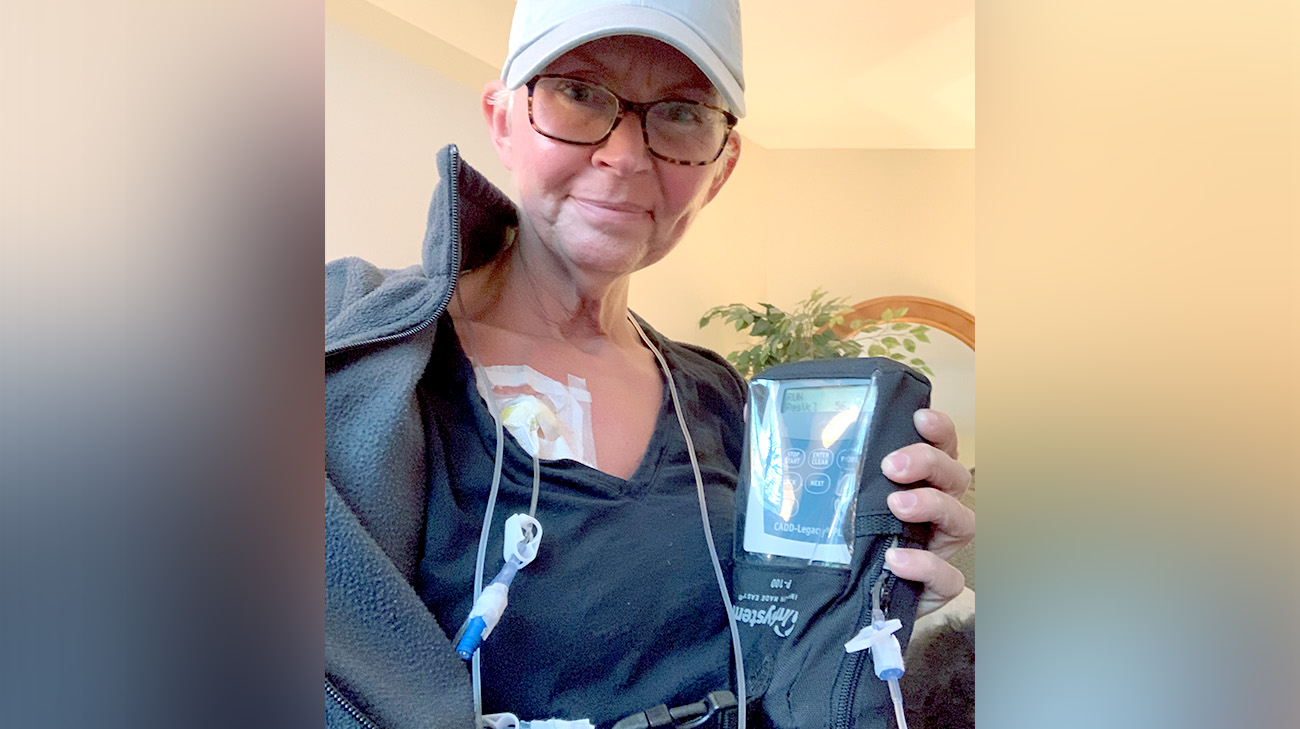
Using a portable pump, Claire can undergo her chemotherapy treatments at home. (Courtesy: Claire Firrell)
Following her second recurrence in April 2018, Claire has been on chemotherapy every two weeks since. Being an active mom, Claire’s care team continually works with her to maintain her quality of life. This includes receiving intravenous (IV) chemotherapy through a portable pump connected to an implanted port under her collarbone. When it’s time for her infusion, Claire comes to Cleveland Clinic to have the pump attached, then goes home while it slowly delivers the chemotherapy. After it’s complete, she returns to have the pump removed. This allows Claire to undergo her treatments without having to stay in the hospital.
“I’m very grateful for the pump because you used to have to be in the hospital for three consecutive days. I don't know how I would have managed that with three kids,” says Claire, who’s able to go about her daily routine with the pump.
Aside from colorectal cancer, Claire has also been treated for thyroid cancer, bouts of skin cancer and multiple broken bones, including when she broke both hands on the same day. Despite all this, Claire says she maintains a glass-half-full mindset.
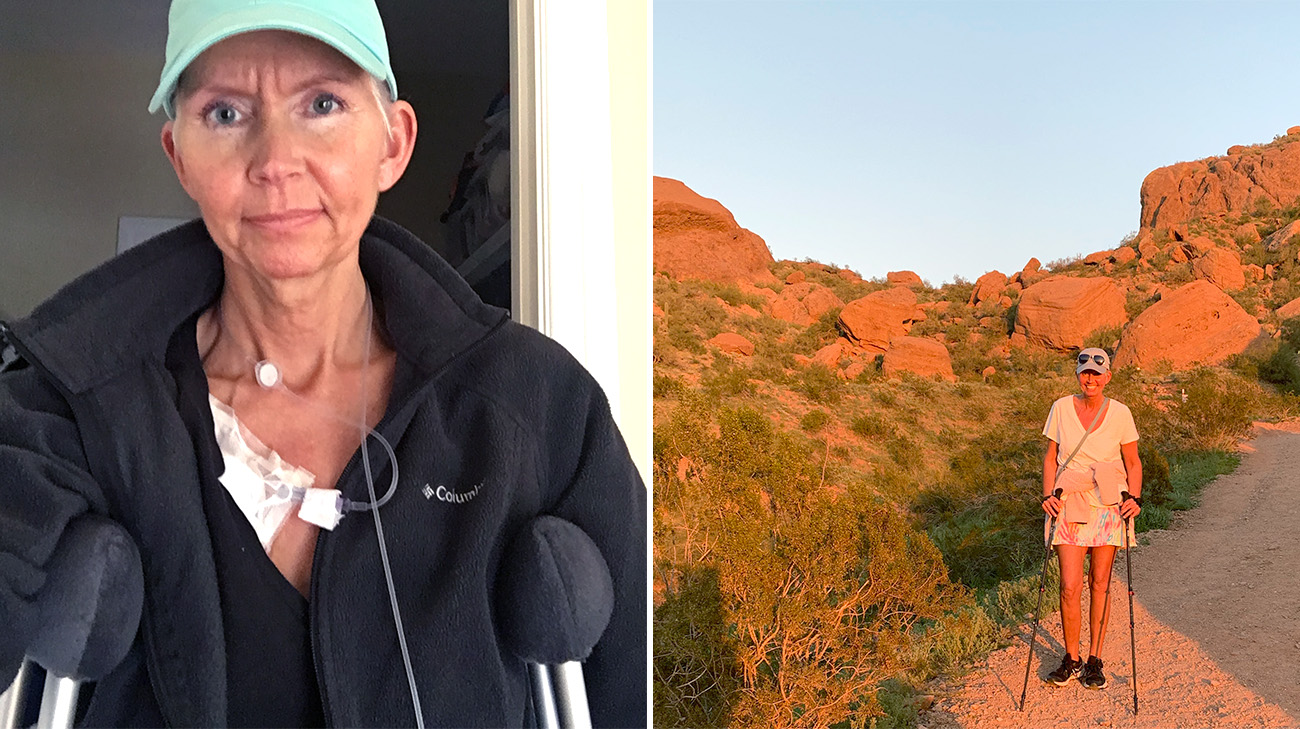
Claire has continued pushing forward throughout her cancer journey, even after suffering from multiple broken bones over the years. (Courtesy: Claire Firrell)
“People will ask me if I would change anything. My answer is always no. I have a whole new perspective on life, and I feel the universe just thought, ‘Oh, she's got broad shoulders, she can hack it,’” says Claire.
Dr. Khorana adds, “Claire remained resilient and unflappable, even after her cancer came back a second time. She doesn’t complain and does whatever it takes to keep herself and her family moving forward.”
As she approaches her 200th round of chemotherapy, Claire’s cancer currently remains stable with no signs of growth. She continues following up with Dr. Khorana and her care team to monitor her condition and look for any signs her treatment needs adjusted.

Claire has been riding in VeloSano’s Bike to Cure event since 2018. (Courtesy: DHLewisPhotography)
“From my experience, I know medicine is constantly changing. There are always new treatments being developed, which is why research is so important,” says Claire.
That’s in part why Claire continues riding in VeloSano’s annual Bike to Cure event, where 100% of participant-raised dollars go directly towards funding cancer research at Cleveland Clinic.
“Sometimes people feel helpless or powerless. But taking part in VeloSano is something you can do that’s really going to make a difference – all the money raised is going to the cause. The atmosphere of Bike to Cure is also fantastic, and you feel energized by it. It’s great for everyone who takes part and offers a sense of support for those going through a cancer journey themselves,” says Claire, who’s been participating in VeloSano since 2018.
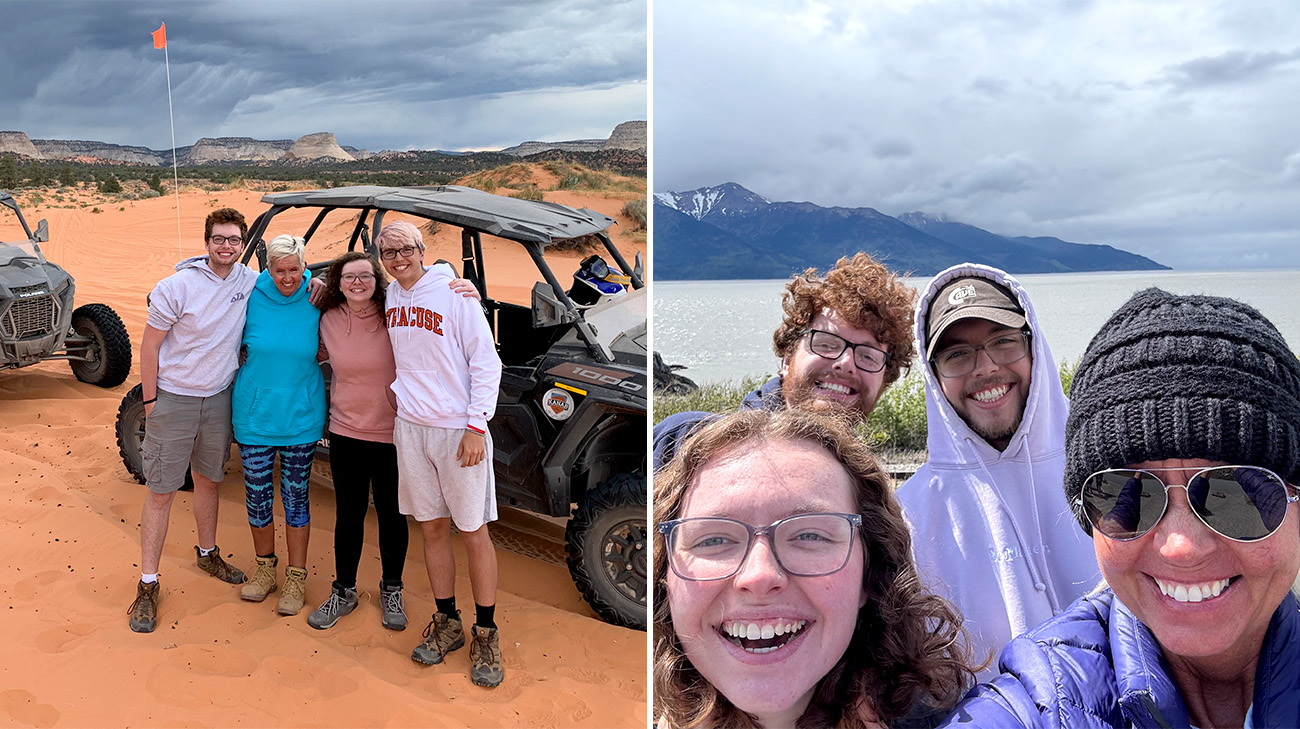
While keeping up with the treatment she needs, Claire can continue traveling and exploring new places with her three children. (Courtesy: Claire Firrell)
With her cancer currently at bay, Claire looks forward to creating new memories with her children. And whether it’s traveling or simply taking her dog for a walk, she is able to keep doing the things she loves while undergoing treatment.
“There's always a silver lining, and there's a time and place to talk about the silver linings. Obviously, when you first get the news, you don't want to hear everything is going to be fantastic because it's not. I need to have my couple hours to vent. But with new treatments being developed, and a community like VeloSano to tap into – you've got to keep pushing forward,” says Claire.
Related Institutes: Cleveland Clinic Cancer Center, Digestive Disease & Surgery Institute

